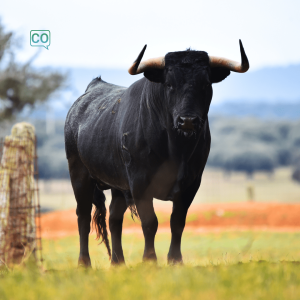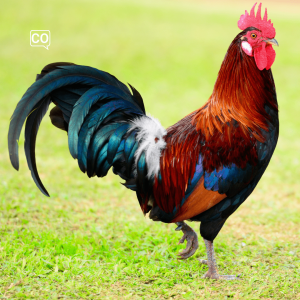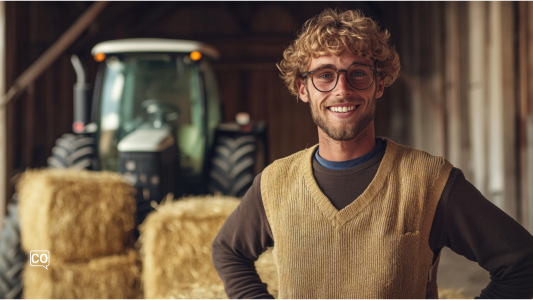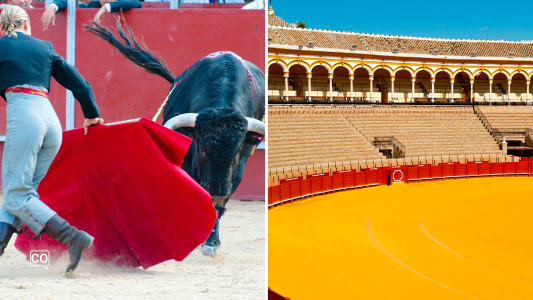Animales de granja
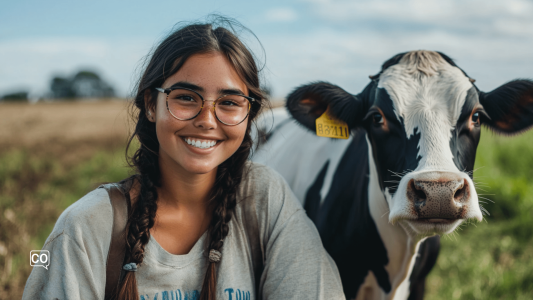
Learning goals:
- Aprende los nombres de los animales de la granja (Learn the names of the farm animals)
-
La diferencia entre
"por qué" y"porque" (The difference between "por qué" and "porque") - El toro de lidia: una tradición en la cultura española (The fighting bull: a tradition in Spanish culture)
Learning module 2 (A2): Naturaleza y medio ambiente (Nature and environment)
Recap exercises of the previous lesson
Teaching guidelines +/- 60 minutes
Core vocabulary (13)
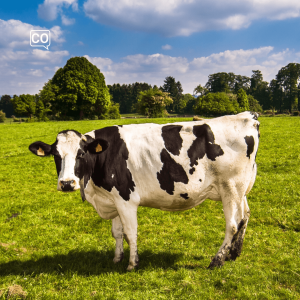
La vaca está en el campo porque necesita comer hierba.
(The cow is in the field because it needs to eat grass.)
La vaca
(The cow)
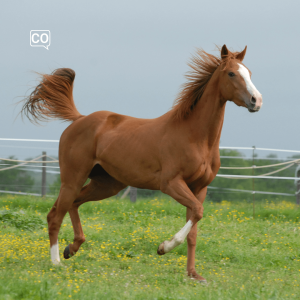
El caballo está en el campo porque necesita descansar.
(The horse is in the field because it needs to rest.)
El caballo
(The horse)
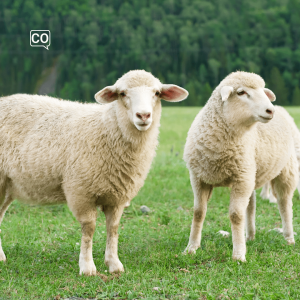
La oveja está en el campo porque la granja está cerrada.
(The sheep is in the field because the farm is closed.)
La oveja
(The sheep)
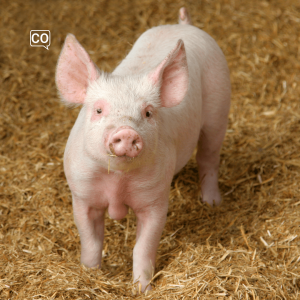
El cerdo está en el campo porque es un animal de granja.
(The pig is in the field because it is a farm animal.)
El cerdo
(The pig)
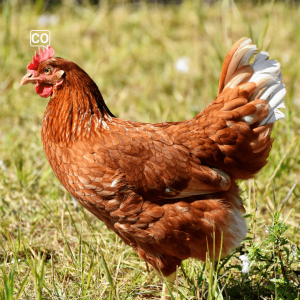
No alimentes a la gallina hasta mañana porque es la orden del granjero.
(Do not feed the hen until tomorrow because it is the farmer's order.)
La gallina
(The hen)
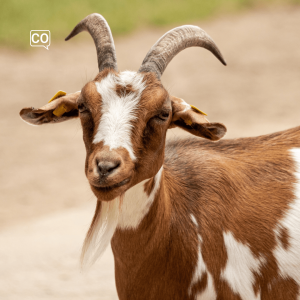
Voy al campo porque quiero ver la cabra en la granja.
(I am going to the countryside because I want to see the goat on the farm.)
La cabra
(The goat)
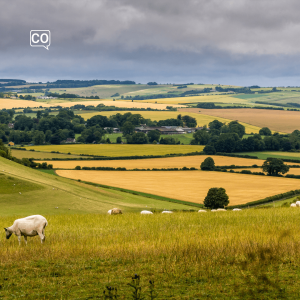
El caballo corre por el campo porque busca a la oveja.
(The horse runs through the field because it is looking for the sheep.)
El campo
(The countryside)
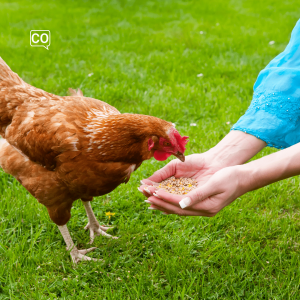
Nosotros alimentamos a las gallos por la tarde.
(We feed the cockerels in the afternoon.)
Alimentar
(To feed)
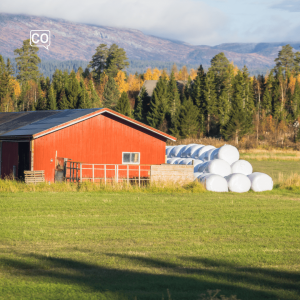
La granja tiene muchos animales como vacas, caballos y ovejas.
(The farm has many animals such as cows, horses, and sheep.)
La granja
(The farm)
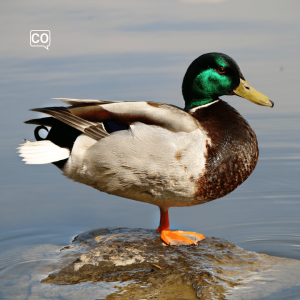
El pato está en la granja porque necesita alimentar a los patitos.
(The duck is on the farm because it needs to feed the ducklings.)
El pato
(The duck)
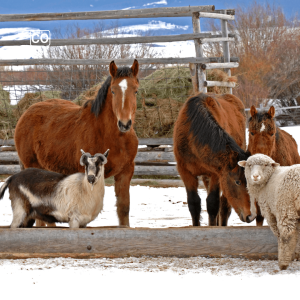
Estoy en la granja porque quiero ver el animal.
(I am at the farm because I want to see the animal.)
El animal
(The animal)
Listening materials
Our listening materials implement the verbs, vocabulary and grammar topics of this lesson. Audio and video available!
A2.8.1 Diálogo: Un día en la granja con Pedro y Ana
Spanish A2.8.1 A day on the farm with Pedro and Ana
Pedro y Ana están en la granja alimentando a los animales. Practica vocabulario sobre animales de la granja con este diálogo fácil en español.
(Pedro and Ana are at the farm feeding the animals. Practice farm animal vocabulary with this easy dialogue in Spanish.)
Teaching guidelines +/- 15 minutes
A2.8.2 Gramática: La diferencia entre "por qué" y "porque"
Spanish A2.8.2 The difference between "por qué" and "porque"
(Learn the difference between "por qué" and "porque" in Spanish.)
Teaching guidelines +/- 15 minutes
A2.8.3 Cuento corto: Los animales felices de la granja de Luis
Spanish A2.8.3 The Happy Animals on Luis's Farm
Luis cuida a los animales de su granja. Aprende sobre la vaca, el cerdo, el gallo y mucho más a través de esta cuento.
(Luis looks after the animals on his farm. Learn about the cow, the pig, the rooster and much more through this story.)
Teaching guidelines +/- 15 minutes
A2.8.4 Cultura: El toro de lidia: una tradición en la cultura española
Spanish A2.8.4 The fighting bull: a tradition in Spanish culture
El toro de lidia es parte de una tradición española donde toros participan en las corridas.
(The fighting bull is part of a Spanish tradition where bulls participate in bullfights.)
Teaching guidelines +/- 10 minutes
Exercises
These exercises can be done together during conversation lessons or as homework.
Exercise 1: Find the words
Instruction: Find the words, mark them and make sentences with the words.
Show answers Show hintsHints
The countryside , The pig , To feed , The hen , The horse , The cow
Answers
Score: 0/6
| El campo | (The countryside) |
| El cerdo | (The pig) |
| La vaca | (The cow) |
| El caballo | (The horse) |
| Alimentar | (To feed) |
| La gallina | (The hen) |
Exercise 2: Reorder sentences
Instruction: The words in these sentences have been shuffled! Sort them so that they make a valid sentence again and translate.
Show answers Show translationExercise 3: Translate and make sentences
Instruction: Translate the words and phrases below and use it in a conversation or text.
Show answersExercise 4: Translate and use in a sentence
Instruction: Translate and say the word out loud. Use the word in a sentence.
Show translation|
1.
La granja
|
(The farm) |
|
2.
La gallina
|
(The hen) |
|
3.
Alimentar
|
(To feed) |
|
4.
La vaca
|
(The cow) |
|
5.
El animal
|
(The animal) |
Exercise 5: Conjugación verbal
Instruction: Choose the correct word, read the sentence out loud and translate.
Show answers Show translationAlimentar (Presente, indicativo)
1. Yo ... a las vacas en el campo.
2. Ellos ... al pato.
3. Él ... a los toros por la mañana.
4. Nosotros ... a las gallos por la tarde.
5. Vosotros ... a los animales de la granja.
Exercise 6: The difference between "por qué" and "porque"
Instruction: Choose the correct word, read the sentence out loud and translate.
Show answers Show translationpor qué, Por qué, porque
1. ¿... el pato no come hoy?
2. El cerdo duerme mucho ... está cansado después de correr.
3. ¿... la cabra no bebe agua hoy?
4. Alimentamos al gallo tarde ... no tiene hambre ahora.
5. No sé ... las ovejas siempre están con las cabras.
6. Los patos no vienen ... quieren estar en el agua.
7. El toro está fuerte ... come mucho.
8. Alimentamos al caballo primero ... tiene hambre.
Exercise 7: Translate and make sentences
Instruction: Translate the words and phrases below and use it in a conversation or text.
Show answersAppendix 1: Extended vocabulary table
Core vocabulary
(13):
Verbs: 1,
Nouns: 12,
Context vocabulary:
14
| Spanish | English |
|---|---|
| Alimenta | He feeds |
| Alimentado | Fed |
| Alimentan | They feed |
| Alimentar | To feed |
| Animales | Animals |
| Caballos | Horses |
| Cabras | Goats |
| Cerdos | Pigs |
| Corridas | Bullfights |
| El animal | The animal |
| El caballo | The horse |
| El campo | The countryside |
| El cerdo | The pig |
| El gallo | The rooster |
| El pato | The duck |
| El toro | The bull |
| Encierros | Bull runs |
| Gallinas | Hens |
| La cabra | The goat |
| La gallina | The hen |
| La granja | The farm |
| La oveja | The sheep |
| La vaca | The cow |
| Patos | Ducks |
| Toreros | Bullfighters |
| Toros | Bulls |
| Vacas | Cows |
Appendix 2: Verb conjugation tables for this lesson
Alimentar (to feed)
Exercises and examples phrases
- yo alimento I feed
- tú alimentas you feed
- él/ella alimenta he/she feeds
- nosotros/nosotras alimentamos we feed
- vosotros/vosotras alimentáis you feed
- ellos/ellas alimentan They feed
Exercise: Verb conjugation
Instruction: Choose the correct word, read the sentence out loud and translate.
Show answers Show translationAlimentar (Presente, indicativo)
1. Yo ... a las vacas en el campo.
2. Ellos ... al pato.
3. Él ... a los toros por la mañana.
4. Nosotros ... a las gallos por la tarde.
5. Vosotros ... a los animales de la granja.
